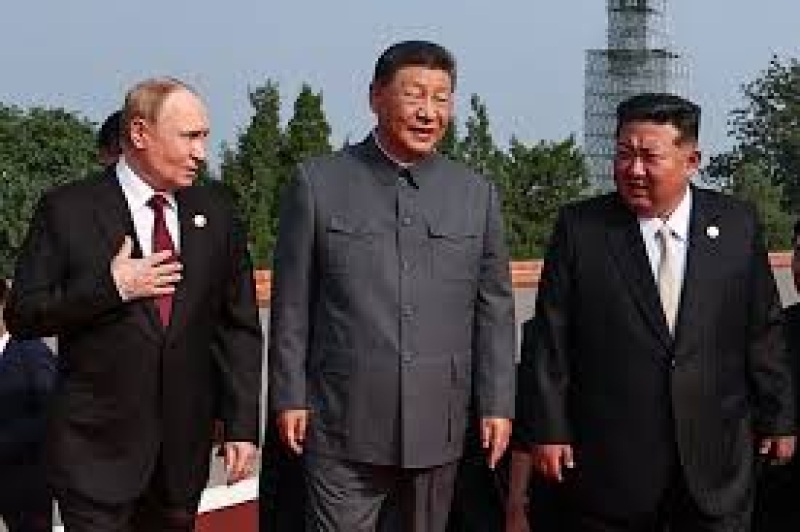- As debate over the location of climate conference razes on, will COP fail this time too? |
- UN Rights Office Warns of Gaza Escalation, West Bank Annexation |
- UN Warns Wildfires and Climate Change Worsen Air Quality |
- OIC Hails Belgian Declaration of Intent to Recognize Palestinian State |
- Bomb blast kills 15 near political rally in Pakistan |
EU Warns Xi-Putin-Kim Alliance a Challenge to World Order

Chinese President Xi Jinping, Russian President Vladimir Putin, and North Korean leader Kim Jong Un in Beijing
European Union foreign policy chief Kaja Kallas has warned that the unprecedented gathering of Chinese President Xi Jinping, Russian President Vladimir Putin, and North Korean leader Kim Jong Un in Beijing represents more than symbolic diplomacy. She described the trilateral display as a direct challenge to the international system founded on rules, stability, and cooperation.
Addressing journalists after the event, Kallas said the sight of Xi flanked by Putin and Kim during a grand military parade in Tiananmen Square was part of an orchestrated effort to promote an alternative world order opposed to the West. “Looking at President Xi standing alongside the leaders of Russia, Iran, and North Korea, these aren’t just anti-Western optics. This is a direct challenge to the international system built on rules,” she stressed.
The Beijing ceremony, held to mark the end of World War II, featured rare images of Xi walking side by side with Putin on his right and Kim on his left. The three leaders shook hands, exchanged warm words, and showcased unity before global cameras, signalling a strengthening of political, military, and economic ties among their countries.
Kallas underscored that this display goes beyond symbolism, pointing to the ongoing war in Ukraine as an example of how China’s material and diplomatic support has sustained Russia’s campaign. “These are realities that Europe needs to confront now,” she said, urging the EU to take a more assertive role in global geopolitics.
In her subsequent speech, the EU’s top diplomat argued that deliberate attempts are underway to reshape the global balance of power. She noted that both China and Russia openly speak of leading “changes not seen in a hundred years,” calling for a revision of the existing international security order.
Kallas cautioned that Europe must not remain a bystander in this shifting landscape. “A new global order is in the making. It will not be shaped without Europe, but it will be shaped by what Europe is willing to do. We must recognise the need for Europe to play a genuine geopolitical role,” she insisted.
The remarks reflect growing European concerns about deepening coordination between Beijing, Moscow, and Pyongyang, particularly in the context of rising tensions in Ukraine, the Korean Peninsula, and the broader Indo-Pacific region. Analysts suggest that the Beijing parade was a carefully crafted message of unity among authoritarian leaders, aimed at countering Western influence and projecting an alternative vision of global power.

